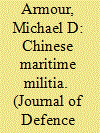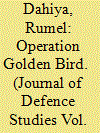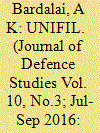| Srl | Item |
| 1 |
ID:
146851


|
|
|
|
|
| Contents |
The South China Sea is a zone of contention between China and other nations in the region. The US Navy has decreased the number of ships available to counter Chinese encroachments here and this power vacuum may be exploited by the Chinese Maritime Militia (CMM). The militia is comprised of fishing vessels that are used to augment the People’s Liberation Army Navy (PLAN), and possesses sophisticated communication and GPS technology. CMM units, using swarm warfare tactics and Network Centric Warfare (NCW), have the potential to become a significant combat multiplier in China’s endeavours to take control of the area. Therefore, it is important to understand the tactics and capabilities of this organisation. Similarly, if Beijing decides to close or interdict the South China Sea trade routes or expand naval influence into the Indian Ocean, other actors, such as India, Australia or Japan may be drawn into direct confrontation with the militia.
|
|
|
|
|
|
|
|
|
|
|
|
|
|
|
|
| 2 |
ID:
146852


|
|
|
|
|
| Contents |
Japan’s long-standing alliance with the US is the key feature of its defence and security policy. However, China’s rise and impact on shaping the regional security architecture, and the vigour of US commitment in the backdrop of a G2 formulation, is making Japan diversify her options. Thus, India now features in the Japanese idea of Asia while it struggles to cope with the fluidity of the regional security landscape. This article critically analyses the increasing space accorded to India and the variables behind Japan’s courtship of it. It probes whether Japan’s India policy is Abe centric, or more enduring in nature, and examines India’s position in Japan’s defence outlook as Tokyo redesigns its security policy. India’s advent in the Japanese geo-strategic frame will endure since the variables that pushed Japan to incorporate India in its strategic design will mature and complicate the regional security environment in the coming years.
|
|
|
|
|
|
|
|
|
|
|
|
|
|
|
|
| 3 |
ID:
146850


|
|
|
|
|
| Contents |
Operation Golden Bird, conducted along the Indo-Myanmar border in the North-Eastern state of Mizoram under the aegis of 57 Mountain Division (57 Mtn Div) in April–May 1995, has often been portrayed as a joint operation between the armed forces of India and Myanmar. In reality, however, this operation was planned and executed by the Indian Army alone, with troops ex 57 Mtn Div and those under operational control of Headquarters Inspector General, Assam Rifles (North) or HQ IGAR(N). The Mizoram police was excluded from the operation, at least in the initial stages. That the Myanmar Army also got involved in the operation was not by design on any side.
|
|
|
|
|
|
|
|
|
|
|
|
|
|
|
|
| 4 |
ID:
146853


|
|
|
|
|
| Contents |
Nations from the developed world have rarely participated in complex and difficult UN peacekeeping operations (PKOs) while those from the developing world have rich peacekeeping experience. The United Nations Interim Force in Lebanon (UNIFIL) is a rare exception among peacekeeping missions as it includes peacekeepers from the North Atlantic Treaty Organization (NATO), along with Western military involvement. NATO members’ involvement in UNIFIL resulted in unusual structures and operational philosophy, and adjusting and adapting to this was difficult for non-Western participants. Despite the differences in training, equipment, culture and tradition amongst the Western and non-Western national contingents, UNIFIL’s contribution in maintaining peace in the region is praiseworthy. The combined effects of the political and military muscles of peacekeepers from Western nations and special skills of the non-Western nations was able to provide much-needed stability to Lebanon, which has not seen a major conflict in almost a decade.
|
|
|
|
|
|
|
|
|
|
|
|
|
|
|
|